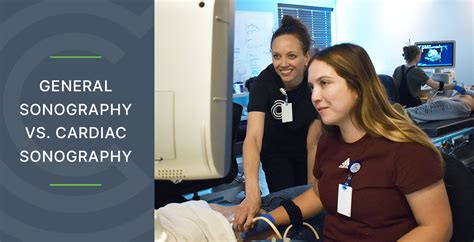As the healthcare industry continues to evolve, medical professionals are increasingly seeking specialized roles that offer a sense of fulfillment and growth. Two in-demand professions that often pique the interest of aspiring healthcare workers are Ultrasound Technologists and Registered Nurses (RNs). While both roles play crucial parts in patient care, they have distinct differences in terms of job responsibilities, education, salary, and work environment.
In this article, we will delve into the five key differences between Ultrasound Techs and RNs, helping you decide which career path best aligns with your skills, interests, and career goals.
1. Job Responsibilities and Specialization

Ultrasound Technologists, also known as Diagnostic Medical Sonographers, are specialized healthcare professionals who use high-frequency sound waves to create images of the body's internal structures. Their primary responsibility is to perform diagnostic ultrasound examinations, prepare patients for procedures, and provide images for physicians to diagnose and treat medical conditions.
Registered Nurses, on the other hand, are versatile healthcare professionals who provide hands-on patient care, administer medications, and coordinate with other healthcare professionals to develop and implement patient care plans. RNs work in a variety of settings, including hospitals, clinics, and community health organizations, and can specialize in specific areas such as pediatrics, oncology, or critical care.
Key Takeaway:
- Ultrasound Technologists specialize in diagnostic imaging, while Registered Nurses provide direct patient care and coordinate with other healthcare professionals.
2. Education and Training

Ultrasound Technologists typically complete a post-secondary certificate or associate's degree program in diagnostic medical sonography, which includes both classroom and clinical training. These programs are usually accredited by the Commission on Accreditation of Allied Health Education Programs (CAAHEP) and lead to professional certification as a Registered Diagnostic Medical Sonographer (RDMS).
Registered Nurses, by contrast, must complete an associate's degree or bachelor's degree program in nursing, which includes classroom and clinical training. RNs must also pass the National Council Licensure Examination (NCLEX-RN) to obtain licensure and practice as a registered nurse.
Key Takeaway:
- Ultrasound Technologists require a post-secondary certificate or associate's degree, while Registered Nurses require an associate's or bachelor's degree and licensure.
3. Salary and Job Outlook

According to the Bureau of Labor Statistics (BLS), the median annual salary for Ultrasound Technologists was $75,380 in May 2020. The job outlook for Ultrasound Technologists is promising, with the BLS predicting a 14% employment growth rate from 2020 to 2030, which is faster than the average for all occupations.
Registered Nurses, on the other hand, had a median annual salary of $76,840 in May 2020, according to the BLS. The job outlook for RNs is also favorable, with the BLS predicting a 9% employment growth rate from 2020 to 2030, which is faster than the average for all occupations.
Key Takeaway:
- Both Ultrasound Technologists and Registered Nurses have competitive salaries and promising job outlooks, with Ultrasound Technologists experiencing faster employment growth.
4. Work Environment and Scheduling

Ultrasound Technologists typically work in diagnostic imaging departments, hospitals, or outpatient clinics, and may work irregular hours, including evenings and weekends. They often work independently, using specialized equipment to perform diagnostic examinations.
Registered Nurses, on the other hand, work in a variety of healthcare settings, including hospitals, clinics, and community health organizations. RNs often work in fast-paced environments, coordinating with other healthcare professionals to provide patient care. They may work irregular hours, including nights, weekends, and holidays.
Key Takeaway:
- Ultrasound Technologists often work independently in diagnostic imaging departments, while Registered Nurses work in fast-paced environments, coordinating with other healthcare professionals.
5. Career Advancement Opportunities

Ultrasound Technologists can advance their careers by specializing in specific areas, such as pediatric sonography or vascular sonography. They can also pursue leadership roles, such as department manager or educator, or start their own ultrasound consulting businesses.
Registered Nurses can advance their careers by specializing in specific areas, such as critical care or oncology. They can also pursue leadership roles, such as nurse manager or director of nursing, or pursue advanced degrees, such as a master's or doctoral degree, to become advanced practice registered nurses (APRNs) or nurse educators.
Key Takeaway:
- Both Ultrasound Technologists and Registered Nurses have opportunities for career advancement, with Ultrasound Technologists specializing in specific areas and Registered Nurses pursuing leadership roles or advanced degrees.





What is the typical salary range for Ultrasound Technologists?
+The typical salary range for Ultrasound Technologists is between $60,000 and $90,000 per year, depending on location, experience, and specialization.
Do Registered Nurses require a bachelor's degree?
+No, Registered Nurses can enter the profession with an associate's degree, but many employers prefer or require a bachelor's degree for certain positions.
What is the job outlook for Ultrasound Technologists?
+The job outlook for Ultrasound Technologists is promising, with the Bureau of Labor Statistics predicting a 14% employment growth rate from 2020 to 2030.
In conclusion, while both Ultrasound Technologists and Registered Nurses play vital roles in the healthcare industry, they have distinct differences in terms of job responsibilities, education, salary, work environment, and career advancement opportunities. By understanding these differences, you can make an informed decision about which career path aligns with your skills, interests, and career goals.
We hope this article has provided valuable insights into the differences between Ultrasound Technologists and Registered Nurses. If you have any questions or would like to share your thoughts, please leave a comment below.
